Az Pbs Til We Meet Again
Henry Louis Gates Jr. gives behind-the-scenes look at popular PBS show during Q&A
May 9, 2022
Henry Louis Gates Jr. has inspired hundreds of celebrities and public figures throughout the years to explore their ancestry and make insightful revelations about their past.
However, Gates' interest in ancestry didn't start after he became a renowned scholar, professor, filmmaker, journalist and cultural critic. Instead, it began when he was a young child in West Virginia interviewing his parents about their family tree. 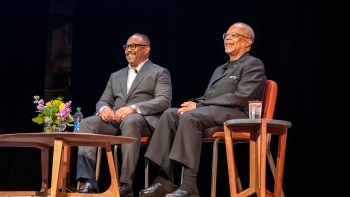 Cronkite School Dean Battinto L. Batts Jr. (left) shares a laugh with Henry Louis Gates Jr. during "Past Connections That Bind Us All: A Conversation with Henry Louis Gates Jr." on April 30 at ASU Gammage. Download Full Image
Cronkite School Dean Battinto L. Batts Jr. (left) shares a laugh with Henry Louis Gates Jr. during "Past Connections That Bind Us All: A Conversation with Henry Louis Gates Jr." on April 30 at ASU Gammage. Download Full Image
That interest grew throughout the years, eventually serving as the foundation for his hugely successful PBS show "Finding Your Roots with Henry Louis Gates Jr.," where he explores the ancestry of influential people from diverse backgrounds.
Gates discussed the origins of his show, his own interest in genealogy and family history research, and other topics during during "Past Connections That Bind Us All: A Conversation with Henry Louis Gates Jr.," a Q&A event by Arizona PBS and Arizona State University's Walter Cronkite School of Journalism and Mass Communication on Saturday, April 30, at ASU Gammage. The event was graciously sponsored by Arizona Gammage, SRP and ASU Library.
Gates also told behind-the-scenes stories describing some of the more notable discoveries with the celebrities and public figures who've appeared on his show, and answered questions submitted by community members during the event, which was moderated by Battinto L. Batts Jr., dean of the Cronkite School, and Arizona PBS General Manager Adrienne Fairwell.
Although Gates first developed an interest in ancestry as a child, he was further inspired by the 1977 television miniseries "Roots," which was based on the family history of author Alex Haley.
"I wanted to be like Alex Haley … (I wanted to know) what village, what ethnic group I descended from," Gates said.
In 2000, he was contacted by a Black geneticist at Howard University who was looking for volunteers for DNA research. Gates volunteered, eventually learning that he was a descendant of the Nubian tribe.
He was the only person out of 2,000 who were tested to descend from that tribe.
After Gates discovered his own genealogy, he decided that he wanted to help others do the same. So he developed an idea for a documentary where he would test the DNA of eight prominent Black figures and trace their ancestry back to slavery.
After a few years of planning and pitching, he launched "African American Lives," with Oprah Winfrey as one of his first guests.
Gates initially focused on Black celebrities and public figures, including Winfrey, Quincy Jones, Chris Tucker and Ben Carson, until he received a letter from a Russian Jewish woman imploring him to include other races and ethnicities.
"I'm a professor of African and African American studies. It had never occurred to me to even think about doing white peoples' DNA," he said.
From there, Gates included celebrities such as Meryl Streep and Stephen Colbert, allowing the series to evolve to its current status as one of PBS' most-watched programs.
As the show progressed, Gates said the series had to develop an ethics policy and protocols whenever they discovered that either the celebrity or one of their relatives was adopted. He described the stress and trauma involved when someone finds out their relative isn't related to them by blood.
"I have had to tell people that their father wasn't their father," he said. "You can't tell people that live (on television)."
Toward the end of the discussion, Gates debunked some misinformation regarding the slave trade, including the true number of Africans who arrived in America, and shared advice and resources for those who wanted to learn more their genealogy.
"It's like a whole word has opened up because of this data," he said. "There are a whole lot of ancestors on your family tree coming from different parts of Africa, different parts of Europe. Your genome is a mosaic of the diversity of the people of the world."
View photos of the event here.

Arizona PBS, Cronkite School to host event featuring Henry Louis Gates Jr.
Host of PBS show 'Finding Your Roots' comes to ASU Gammage on April 30
April 11, 2022
Arizona PBS, ASU Gammage and Arizona State University's Walter Cronkite School of Journalism and Mass Communication will host a dynamic event,"Past Connections That Bind Us All: A Conversation with Henry Louis Gates Jr. " at 7 p.m. Saturday, April 30, at ASU Gammage.
Presented with support from Salt River Project, the 90-minute event will feature Gates offering behind-the-scenes details about the discovery process for celebrity guests of "Finding Your Roots," his successful PBS series now in its eighth season.  Henry Louis Gates Jr. will appear at ASU Gammage for the talk "Past Connections That Bind Us All: A Conversation with Henry Louis Gates Jr." at 7 p.m. Saturday, April 30. Download Full Image
Henry Louis Gates Jr. will appear at ASU Gammage for the talk "Past Connections That Bind Us All: A Conversation with Henry Louis Gates Jr." at 7 p.m. Saturday, April 30. Download Full Image
"Our lives are constructed by stories, which are shaped by our families, experiences and surroundings. The collective of these stories is what shapes the American experience and our overall identity as a people," Gates said. "I look forward to visiting ASU to discuss that collective identity and the connections that bind us all."
Members of Arizona PBS can purchase event tickets with a 15% discount. (Members can retrieve their code via an email that was sent out). For seats on the main level, ticket prices range from $30–$70 plus fees. Tickets for balcony seats are available; however, the Arizona PBS member discount is not applicable for these seats. The balcony seat ticket price is $5.50 plus fees for ASU students and $20 plus fees for non-students. To purchase tickets, visit www.asugammage.com.
"We're excited to welcome Dr. Gates to ASU and look forward to an evening of enlightening discussion about our roots and how the past continues to impact our identity today," said Battinto L. Batts Jr., dean of the Cronkite School.
In addition to serving as host of PBS' "Finding Your Roots," Gates, an acclaimed historian, is the Alphonse Fletcher University Professor and director of the Hutchins Center for African & African American Research at Harvard University. An Emmy Award-winning filmmaker, literary scholar, journalist, cultural critic and institution builder, Gates has authored or co-authored 24 books and produced 21 documentary films.
"As the host of one of PBS' flagship programs, we're delighted to welcome Dr. Henry Louis Gates to Arizona, and we're excited to bring this engagement opportunity to our loyal members," said Arizona PBS General Manager Adrienne Fairwell. "As Arizona's largest public media station, a key component of our mission is to facilitate community discussions around important issues facing our state and the nation, and this event will help us do just that."
Gates will participate in a Q&A session composed of questions submitted by Arizona PBS viewers and members of the community. Community members are invited to submit questions that will be showcased during the event's Q&A segment in the form of video messages. To make a video submission, click here.
Arizona PBS presents 'The Futures of Democracy' podcast
Podcast co-hosted and co-produced by ASU Professor Nicole Anderson with Macquarie University's Julian Knowles
March 31, 2022
Arizona PBS presents "The Futures of Democracy" podcast, launching on March 30 and produced and hosted by Nicole Anderson,director of the Institute for Humanities Research at Arizona State University, and Julian Knowles, professor of media and music, and chair of media and communications at Macquarie University, Australia.
In this bi-weekly podcast series, world-renowned experts will examine the emerging challenges of possible futures for democracy in the 21st century. The project reflects upon the health and operation of our democracy as a common good in an environment that has profoundly shifted over the past 20 years.  Arizona PBS presents "The Futures of Democracy" podcast. Download Full Image
Arizona PBS presents "The Futures of Democracy" podcast. Download Full Image
"Futures of Democracy" will launch an introduction on March 30, followed by an interview with ASU President Michael Crow on April 6.
The episodes will air bi-weekly with guests including USC scholar Kate Crawford and ASU experts such as Vice President and Vice Provost Peter Schlosser, Dean Patrick Kenney, Dean Jeffrey Cohen, and professors Adam Nocek, Nina Berman, Evan Berry, Ron Broglio, Richard Amesbury and Judit Kroo, discussing the recent challenges democracy faces in the 21st century.
The comparatively recent rise of social media, concentrations of communication infrastructure and media ownership, questions of internet governance, rights to privacy and access to data are issues that impact all citizens. Uncertainties about truth and evidence, increased racial and gender divisions and the overarching challenges to the environmental commons will also be explored in this new podcast.
In seeking the common good in democracy, the podcast is asking, is democracy in crisis or are we just at a turning point?
"The Futures of Democracy" is available on Google Podcasts, Spotify, Apple Podcasts, Amazon Music and other popular hosting platforms. Project supporters include the Institute for Humanities Research and Arizona PBS Public Broadcasting Service.

Arizona PBS, Delta Dental of Arizona partner to educate children on good oral health
January 14, 2022
The Delta Dental of Arizona Foundation is partnering with Arizona PBS on an educational outreach program to promote good oral health to children in rural communities across the state.
The statewide campaign will boost family involvement in good oral health practices, focusing on the importance of brushing twice a day, changing toothbrushes regularly and visiting the dentist twice a year. A series of free events will be held from February to August in rural areas, including Bullhead City, Flagstaff, Lake Havasu City, Payson, Safford, Show Low, Somerton, Tuba City and Yuma. The events will feature PBS characters, educational crafts, activities and giveaways for children up to age 8. Local dental professionals will offer free dental screenings and fluoride varnish treatments.  Download Full Image
Download Full Image
"Community service is an essential part of Arizona PBS' mission, so we're excited to partner with Delta Dental of Arizona to help educate children and families in rural communities throughout Arizona on the importance of dental care," Arizona PBS General Manager Adrienne Fairwell said.
In addition, children are encouraged to participate in a writing and illustration contest about dental health through Jan. 21. Prizes include a Play Pad tablet, electric toothbrushes and baskets of oral health goodies. Additional details and entry information are available at azpbs.org/writers.
"Tooth decay is the number one chronic disease among children and is nearly 100% preventable. By offering these free events with Arizona PBS, we hope to help families establish good oral health habits and recognize the power of a healthy smile," said Michael Jones, president and chief executive officer of Delta Dental of Arizona.
Arizona PBS and Delta Dental of Arizona will continue to follow COVID-19 protocols recommended by the CDC to ensure the safety of participants. For a full listing of events, visit azpbs.org.
Written by Alyssa Gomez
Arizona PBS, ASU Cronkite School earn Rocky Mountain Emmy Awards
November 8, 2021
Arizona PBS and the Walter Cronkite School of Journalism and Mass Communication at Arizona State University swept up a total of 10 Emmys and Student Production Awards at the Rocky Mountain Southwest Chapter of the National Academy of Television Arts and Sciences — in professional categories ranging from arts and entertainment to politics and government, as well as student categories ranging from newscasts to sports.
Arizona PBS took home three Emmys, covering a variety of magazine programs, audio production and interview content. The programs that snagged awards were "Catalyst" and "Plate and Pour." Watch Arizona PBS' Emmy winning programs here. 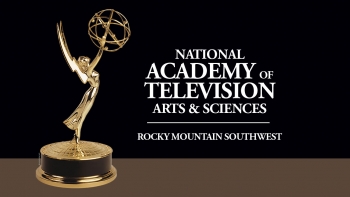 Arizona PBS and the Cronkite School earned 10 Emmys and Student Production Awards at the Rocky Mountain Emmy Awards this past weekend. Download Full Image
Arizona PBS and the Cronkite School earned 10 Emmys and Student Production Awards at the Rocky Mountain Emmy Awards this past weekend. Download Full Image
The "2020 Arizona Senate Debate," one of Arizona PBS' most-viewed programs in the station's history, won first place in the Politics/Government Content category. During the debate, the moderators — particularly Ted Simons of "Arizona Horizon" — were praised for their questions and persistence.
Students at Arizona State University's Walter Cronkite School of Journalism and Mass Communication earned seven Student Production Awards in six categories this year. The awards recognize the best in collegiate journalism, and since 2009, Cronkite students have won 71 Student Production Awards.
Arizona State University also won an award for Branded Content: Short Form with "Innovation at ASU," produced by the Office of Media Relations and Strategic Communications.
"I am extremely proud of the performance of the Cronkite School and Arizona PBS in the Emmys competition," said Cronkite School Dean Battinto L. Batts Jr. "Our success is due to the work of many talented students and professionals who have dedicated themselves to the cause of journalism. It is a privilege to be able to celebrate their achievements this evening."
Adrienne Fairwell, general manager of Arizona PBS, said, "I couldn't be prouder of the Arizona PBS team Rocky Mountain Emmy award winners. The award recipients, and those nominated, should be applauded as their work is a true testament to their dedication to Arizonans. This team worked hard during the pandemic of 2020 to produce content that was entertaining, educational and informative. We are very proud to be our communities' Arizona connection."
The Rocky Mountain Southwest Chapter of the National Academy of Television Arts and Sciences honors the art and science of individuals working in television with Emmy Awards, and covers the regions of Arizona, New Mexico, Utah and southeastern California.
The 44th Annual Rocky Mountain Emmy Awards were held at the Phoenician.
Arizona PBS and Cronkite School winners are:
Arizona PBS
Technology: Long-Form Content
"Catalyst: Isotopes, Migrants & Mysteries"
Steve Filmer, producer
Vanessa Ruiz, producer
Politics/Government: Long-Form Content
2020 Arizona Senate Debate
Allysa Adams, producer
Ted Simons, host
Lorraine Rivera, host
Yvonne Wingett Sanchez, host
Mike Sauceda, producer
Laarni Fernandez Nuez, producer
Shana Fischer, producer
Interview/Discussion Content
"Plate & Pour: Pass It On"
Margery Punnett, series producer
Melissa Thompson, executive producer
Rebecca Guldberg, producer
Mark Tarbell, producer
Arizona State University
Branded Content: Short Form
"Innovation at ASU"
Joshua Belveal, director/writer/editor/motion graphics
Amy Chou, producer
Safwat Saleem, producer/writer
Cronkite School Student Production Awards
Newscast
Cronkite News, March 23, 2021
Angel Jimenez, producer
Multimedia Journalist
"FilmBar Saved"
Tyler Manion, reporter
Video Essay
"A Mother's Journey"
Franco LaTona, reporter
Non-Fiction Short Form
"Gender Pioneer in Arizona"
Tyler Manion, reporter
Sports Story or Segment
"Seated Golfer Prepares for U.S. Disabled Open"
Jordan Spurgeon, reporter
"A Sunrise Prayer on Piestewa Peak"
Sarandon Raboin, reporter
Talent: News or Sports
Zachary Keenan, reporter
Written by Alyssa Gomez

Award-winning sports journalist William Rhoden to give Cronkite School convocation address
November 4, 2021
William C. Rhoden, an award-winning national sports writer and visiting professional at Arizona State University's Walter Cronkite School of Journalism and Mass Communication, will deliver the keynote address at the Cronkite School's fall 2021 convocation.
The ceremony will take place at 7:30 p.m. Dec. 14 at Arizona Federal Theatre, 400 W. Washington St., Phoenix. More than 260 students are expected to graduate. 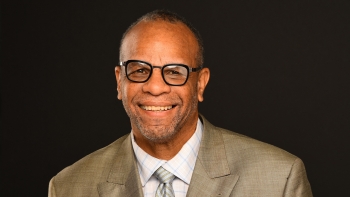 William C. Rhoden will deliver the keynote address at the Cronkite School's fall 2021 convocation. Download Full Image
William C. Rhoden will deliver the keynote address at the Cronkite School's fall 2021 convocation. Download Full Image
"William Rhoden is a strong and familiar voice for truth, justice and accountability not only in sports, but our society as a whole. He is an unquestioned leader in his craft and has put his time, treasure and connections toward providing opportunities and guidance for others coming along in the field. I am excited that he will be our convocation speaker and look forward to his words of encouragement and insight," said Cronkite School Dean Battinto L. Batts Jr.
Rhoden is one of the most accomplished sports journalists of his generation and is regarded as an expert on the topics of sports and race. He is currently a columnist and editor-at-large at The Undefeated, ESPN's digital platform that explores the intersection of race, culture and sports.
In collaboration with The Undefeated, ESPN and the Walt Disney Company, he has established the Rhoden Fellows Initiative, which identifies and trains aspiring African American journalists from historically Black colleges and universities.
"I'm honored to have been asked by Dean Batts to deliver the commencement address to the next generation of journalists. I cherish my connection with Cronkite, which has been on the cutting edge of teaching students how to navigate the challenges facing young journalists," Rhoden said.
At the Cronkite School, Rhoden serves as a visiting professional and teaches "Opinion in the Digital Age," which introduces students to the art of crafting and forming thoughtful opinion pieces for all existing platforms.
In addition, he also is a visiting senior practitioner for the Global Sport Institute, where he provides feedback on the institute's strategic direction and helps develop concepts for the Global Sport Matters content hub.
Rhoden rose to prominence at The New York Times, where he published his award-winning "Sports of the Times" column for 26 years and established himself as one of the top sports columnists in the country.
The veteran journalist has received numerous career honors.
The National Sports Media Association announced Rhoden's election into its Hall of Fame in January 2021. In 2018, the National Association of Black Journalists inducted Rhoden into its Hall of Fame for contributions to journalism and the Black community.
He won a Peabody Award in 1996 as a writer for HBO's documentary "Journey of the African American Athlete" and earned an Emmy Award for his writing on the documentary "Breaking the Huddle: The Integration of College Football." Rhoden is an accomplished author who published "Forty Million Dollar Slaves" in 2006 and "Third and a Mile: The Trials and Triumphs of The Black Quarterback" in 2007.
He was also presented with the 2017 Sam Lacy-Wendell Smith Award by the Shirley Povich Center for Sports Journalism at the University of Maryland Philip Merrill College of Journalism for contributions to racial and gender equality in sports.

Real estate developer's donated ranch aids university's mission
Real estate gifts are increasing because of the benefits they offer for donors
September 30, 2021
Iconic real estate developer Rusty Lyon Jr. wanted to help future generations pursue their educational and professional dreams. One way he did that is through what he knew best — real estate.
Lyon was a real estate visionary who started his career at his father's brokerage, Russ Lyon Realty, after serving as an Air Force pilot in the Korean War. He founded Westcor Companies in 1964 and developed more than 12 Valley malls in his career. Lyon branched into hospitality development and is credited with designing and building the Boulders Resort and Spa and others.  The main residence of La Cienega Ranch, a 77.25-acre property donated to the ASU Foundation that was recently sold.
The main residence of La Cienega Ranch, a 77.25-acre property donated to the ASU Foundation that was recently sold.
He ran Westcor for nearly 40 years before selling it to shopping center developer Macerich in 2002. He then retired to spend more time at his 77.25-acre La Cienega Ranch at the base of the Mogollon Rim near Payson, Arizona. The ranch was a place to unwind and escape the metropolitan busyness for Lyon, his wife, Rosie, and their children and grandchildren.
Rosie Lyon died in 2008, and once her husband's health declined in 2016 the family donated La Cienega Ranch to the ASU Foundation for A New American University to benefit Arizona State University. Rusty Lyon died several months later.
The foundation's real estate affiliate, University Realty, recently sold the ranch that included nearly 15,000 square feet of livable space among seven homes, a barn with horse stalls, helipad, pond and group ramada for $4.5 million.
Real estate gifts are increasing for universities because of the many benefits they offer for alumni and other donors. From fiscal years 2016 to 2020, public and private U.S. colleges and universities received more than 3,630 real estate gifts valued at $928.3 million from donors, according to survey data from the Council for Advancement and Support of Education.
"Gifts of real estate may provide donors income, tax benefits and the opportunity to make a difference," said Brad Grannis, portfolio and assets manager for University Realty. "There are several options to donate real estate, depending on when you want to transfer the property and whether money is owed on it."
Over the years, Grannis helped the ASU Foundation receive several real estate gifts, which have funded scholarships and enrichment opportunities at ASU.
For the Lyons, donating the ranch to ASU made the most sense.
"It all depends on each person's estate, but it certainly can have tax advantages," said Scott Lyon, one of the Lyons' sons and founder of Westroc Hospitality. "At the time, the market was pretty soft, and it's such a narrow market for who would be buying a property like that. If they (my parents) sold it, they'd have to pay capital gains taxes. If they kept it in the family, we would have to pay estate taxes on the value of the ranch and not be able to sell it in time before the taxes were due. They eliminated a burden on the family from an estate standpoint."
Lyons' support of ASU
Lonnie Ostrom, former president of the ASU Foundation, has fond memories of the Lyons and their ranch. He and his wife, Martha, became good friends with the Lyons and visited their ranch periodically where they played bridge and enjoyed the property's amenities.
"They were just really humble, down-to-earth people," Ostrom said. "They were very wealthy, and you'd never know it."
Ostrom recalls taking development officers from ASU's Teachers College — now the Mary Lou Fulton Teachers College — to Charleston's Restaurant for lunch, and he'd invite Rosie Lyon to join them.
"She always brought coupons," Ostrom said. "I'd say, 'We're paying for it,' and Rosie would say, 'I know, but this will make it a little less.' She had a great sense of humor, and they loved ASU."
The Lyons were longtime ASU supporters who donated to athletics, W. P. Carey School of Business, The College of Liberal Arts and Sciences, Mary Lou Fulton Teachers College, Arizona PBS, Herberger Institute for Design and the Arts and other units and programs.
Rosie Lyon graduated with a degree in elementary education from Arizona State College, the precursor to ASU. She was inducted into ASU's College of Education Hall of Fame in 2004, and she received the Alumni Service Award in 2006 and became a lifetime member of the ASU Alumni Association. She served on the executive committee for the ASU Campaign for Leadership from 1995 to 2001 and was a member of the Adopt A Devil Program.
Rusty Lyon served on the ASU Foundation and the University Research Park boards and was active with the university for a while, Ostrom said.




La Cienega Ranch history
La Cienega Ranch – named after a ranch in Rosie Lyon's family – was a summer retreat for the Lyon family from the mid-1980s until 2016 when they donated it, said Scott Lyon, who toured the property with his parents when they first saw it.
"My mom, Rosie, it was really her gig," he said. "Dad loved being there when he was there, but she had a soft spot for it."
There was an old post office at the site of the tack room until it burned in 1990 in the Dude Fire, which devastated more than 24,000 acres, destroyed more than 70 structures and killed six fire crew members. The other structures at the ranch remained, but the surrounding ponderosa pine forest was ravaged by the flames.
"That fire really broke my mom's heart at that time," Scott Lyon said. "They stuck it out. They continued to improve the property."
Two homes, a maintenance garage and a barn with tack room were built on the property following the fire.
One of the original structures at the ranch, called the Gingerbread House, served as a primary residence until the Lyons built the more than 3,700-square-foot rustic lodge in 1986 that was designed by Bob Bacon, architect for the Boulders Resort and Spa in Scottsdale. The Gingerbread House was built in approximately 1880 and was actually two historic homes that were later connected together to make one log cabin, Scott Lyon said, adding that he, his wife and daughters stayed there several times.
He and his four daughters have "super fond memories" of La Cienega Ranch and spending time in the area hiking, exploring and horseback riding.
The Lyon family's generosity will enable University Realty to invest in real estate for the benefit of ASU.
The family wanted their gift to benefit real estate-related opportunities, given their involvement in the industry, Grannis said, adding that real estate gifts to ASU can be designated for any cause the donor chooses.
"Donors receive a charitable deduction for the appraised value of their property and forgo the expense of closing costs," said Frank Aazami, broker with Russ Lyon Sotheby's International Realty who represented University Realty in the sale of the ranch. "The donation of appreciated real property to the foundation is a wonderful way to provide enhanced benefit to donors."
His colleague Erika Sahagun Dickey added that escalating land prices have many owners assessing their options.
"Real estate gifts of appreciated property potentially save significant capital gains tax and can increase the after-tax impact of your charitable giving," she said. "They are a great way to rebalance your property portfolio and support the university in the process."
To learn more about real estate gifts to ASU, contact Brad Grannis at 480-965-8098 or Bradley.Grannis@asu.edu or your development officer.

Arizona PBS to premiere Ken Burns' documentary on life of legendary boxer Muhammad Ali
September 16, 2021
"Muhammad Ali," a new four-part documentary by Ken Burns that examines the life of one of the greatest figures in sports history, will air over four nights on Arizona PBS starting Sept. 19 and ending on Sept. 22. The 2½-hour premiere episode begins at 7 p.m. on Sunday, and the remaining three two-hour episodes follow Monday through Wednesday at 7 p.m.
"Muhammad Ali" follows the life of the former heavyweight boxing champion who also fought for social justice and challenged racial prejudices, religious biases and society's views of athletes and celebrities with a combination of charm, wit and outspokenness. 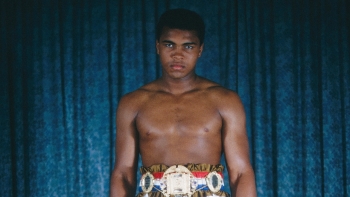 The Ken Burns documentary "Muhammad Ali" follows the life of the former heavyweight boxing champion who also fought for social justice and challenged racial prejudices, religious biases and society's views of athletes and celebrities with a combination of charm, wit and outspokenness. Download Full Image
The Ken Burns documentary "Muhammad Ali" follows the life of the former heavyweight boxing champion who also fought for social justice and challenged racial prejudices, religious biases and society's views of athletes and celebrities with a combination of charm, wit and outspokenness. Download Full Image
The film includes interviews with families and friends, journalists, boxers and historians, among others, and includes archival footage and photographs, as well as contemporary music that represent key moments in Ali's life.
"Muhammad Ali" delves into the life of Ali, who called himself — and was considered by many to be — "the greatest of all time" as he rose to become one of the most dominant and celebrated boxers in history. The three-time world heavyweight champion fought in some of the most dramatic and widely viewed boxing matches ever, including "The Fight of the Century" and "The Thrilla in Manila," both against his rival Joe Frazier, and "The Rumble in the Jungle," in which he defeated George Foreman to regain the heavyweight title that was stripped from him seven years earlier.
Ali was also known for his social stances, including his resistance to the Vietnam War. In 1967, he was convicted of violating the Selective Services Act, resulting in the loss of his boxing license and his heavyweight title. The U.S. Supreme Court unanimously overturned his conviction in 1971.
The documentary also examines Ali's commitment to his Muslim faith and his relationships with Elijah Muhammad and Malcolm X, who profoundly shaped his life and worldview.
Ali, who was diagnosed with Parkinson's disease in 1984, bought a home in Paradise Valley in 2005 and spent his later years in the Phoenix area. The Muhammad Ali Parkinson Center at the Barrow Neurological Institute is named for the boxing great, who was a founder of the center as well as a patient.
Ali died in Scottsdale on June 3, 2016. West Merrell Street in Phoenix near the medical facility was renamed Muhammad Ali Way in 2019.
In addition to the national PBS premiere of "Muhammad Ali," Arizona PBS will tell the story of Zora Folley, a former Chandler city councilman and boxer, who once jumped into the ring with Ali. Jody Crago, administrator of the Chandler Museum, will talk about Folley, who's featured in an exhibit at the museum. The episode will air on "Arizona Horizon" on Friday, Sept. 17, at 5 and 10 p.m.
"Conversations with Muhammad Ali," a series of hourlong discussions about the film, can be viewed here. The trailer can be viewed here.


Piper Trust backs ASU initiatives with $7.1 million in surprise grants
September 15, 2021
Recipients are a new tool to revolutionize how region manages water, Afghan refugee assistance, Dreamer scholarships and KAET/PBS
The ASU Foundation was among 71 Arizona nonprofit organizations to receive surprise grants from the Virginia G. Piper Charitable Trust.
The trust awarded $123 million to the Arizona nonprofits on Sept. 13 during individual meetings that were scheduled with the 71 nonprofit organization leaders. Four grants totaling $7.1 million were awarded to the philanthropy affiliate of Arizona State University. The money is earmarked for new tools to improve how water is managed in Maricopa County and Arizona, Afghan refugee assistance, Dreamers' scholarships and the KAET local public broadcast station run by ASU.
"We're honored to be a recipient of the Virginia G. Piper Charitable Trust's generosity and grateful for the ongoing support the organization provides," ASU Foundation CEO Gretchen Buhlig said. "These grants will help Arizona State University carry out its charter to improve the lives of its students and the communities it serves."
The Virginia G. Piper Charitable Trust has supported numerous ASU units and programs for 27 years with more than $60 million previously.
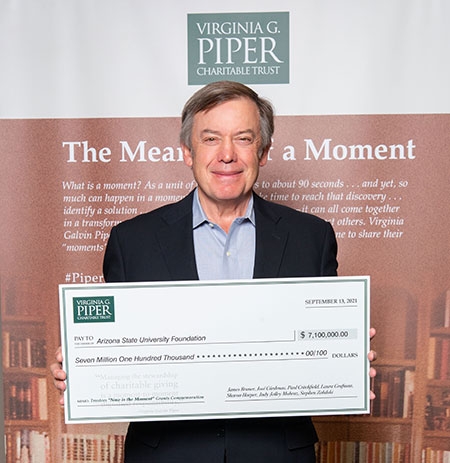
ASU President Michael M. Crow accepts a ceremonial check Monday for the $7.1 million in surprise grants from the Virginia G. Piper Charitable Trust. The grants "are an incredible vote of confidence — the belief that passion and big ideas can have a meaningful effect on our communities," Crow said.
The largest of this week's grants — $5 million — will enable ASU to develop solutions for Arizona to thrive and grow through water security and climate resilience. Researchers will use the investment to revolutionize the way we measure, monitor and manage water in the region. An interdisciplinary team will develop new tools, analytics and data visualizations to give decision-makers credible, relevant knowledge.
One priority for the initiative is to develop fully immersive experiences, using virtual and augmented reality, to help people develop a holistic understanding of future water challenges and opportunities for Arizona and throughout the Colorado River basin.
This new project is led by the Julie Ann Wrigley Global Futures Laboratory and will be a collaborative effort drawing upon the deep well of water expertise at ASU, including the Kyl Center for Water Policy at the Morrison Institute for Public Policy and the Decision Center for a Desert City. The initiative will involve the Decision Theater to convene researchers, policymakers and business leaders to understand and explore solutions.
"Arizona and the Southwest are at a critical moment for water and climate," said Dave White, deputy director of the Global Institute of Sustainability and Innovation. "We have to seize this opportunity for the state to emerge as a national and global leader in water innovation."
Other grants include:
- $1 million grant to provide scholarship assistance to "Dreamers," students who are young immigrants brought to the U.S. as children and who are allowed to remain in the country if they meet certain criteria. They are ineligible for university or federal aid and work-study programs, and they pay higher in-state tuition regardless of whether they grew up in Arizona.
- $1 million to help Afghan citizens who relocate and settle in the United States and need assistance such as housing, transportation, employment and educational opportunities.
- KAET, the local affiliate for PBS, will receive $100,000 in unrestricted funds for the station.
"These surprise grants from the Virginia G. Piper Charitable Trust are an incredible vote of confidence — the belief that passion and big ideas can have a meaningful effect on our communities," said ASU President Michael M. Crow. "Big leaps forward — in research, in social justice, in how we take care of each other — are the result of dedication and hard work, but they also hinge on someone believing in those ideas and providing the funding crucial to moving those ideas into reality. These generous Piper Trust grants, not just for ASU but for so many groups in our state doing important work, are hope made tangible."
Top photo: Lake Mead behind Hoover Dam, on the boundary of Arizona and Nevada, shows a dramatic "bathtub ring" — a visible indicator of the volume of water missing from the Colorado River-fed reservoir. Photo by Charlie Leight/ASU News

Arizona PBS to air Sandra Day O'Connor documentary Sept. 13
A premiere event and panel discussion for members is scheduled for Sept. 8
September 3, 2021
Arizona PBS will honor the legacy of Supreme Court Justice Sandra Day O'Connor with the national premiere of "Sandra Day O'Connor: The First" from 8 to 10 p.m. Monday, Sept. 13, on "American Experience" on Channel 8.1.
An encore presentation is scheduled for 11 p.m. Sept. 13, with subsequent airings at 2 a.m. Tuesday, Sept. 14, and 2:30 p.m. Wednesday, Sept. 15. 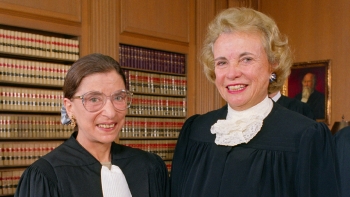 Former Supreme Court Justices Ruth Bader Ginsburg and Sandra Day O'Connor. Download Full Image
Former Supreme Court Justices Ruth Bader Ginsburg and Sandra Day O'Connor. Download Full Image
In addition, Arizona PBS will host a special virtual preview of the documentary for its members at 6:30 p.m. Wednesday, Sept. 8, followed by a panel discussion led by Mi-Ai Parrish, managing director of ASU Media Enterprise and a member of the Sandra Day O'Connor Institute for American Democracy's board of directors. Panelists Nicole Maroulakos Goodwin, managing shareholder of the Phoenix office of Greenberg Traurig, and Leezie Kim, chief legal officer at Fox Restaurant Concepts, will discuss O'Connor's legacy on the court and her influence in Arizona.
O'Connor was the first woman to be appointed to the U.S. Supreme Court after she was nominated by President Ronald Reagan in 1981. She spent 25 years on the court, emerging as one of the more moderate justices of the time.
O'Connor was born in El Paso, Texas, and was raised on a cattle ranch near Duncan, Arizona. She graduated at the top of her class from Stanford Law School but focused on volunteer work and public service after law firms refused to interview her because she was a woman.
This led to her rise through the ranks of the Arizona Republican party from precinct captain to Arizona's assistant attorney general to the first female state Senate majority leader in the nation. O'Connor was a state Court of Appeals judge when she was appointed to the U.S. Supreme Court by Reagan, who had made a campaign promise to name a woman to the highest bench. At the time of her appointment, she had never heard a federal case, but was well-regarded and well-connected within the Republican party.
Her hearings before the Senate Judiciary Committee were the first of any Supreme Court nominee to be broadcast live on television, and tens of millions tuned in. O'Connor's interrogators attempted, time and again over three days, to probe her about her views on the most controversial issues of the time. Her Senate confirmation was unanimous at 99 votes to 0, and she was officially sworn in on Sept. 25, 1981.
During her tenure, O'Connor was frequently viewed as a swing vote due to her moderate stance on various issues, as well as a judge who could negotiate with colleagues on both sides of the aisle. She served as the critical deciding vote on some of the most controversial issues of the 20th century, including those involving race, gender and reproductive rights. O'Connor was the deciding vote in Bush v. Gore in 2000, which gave the presidential election to George W. Bush.
O'Connor retired from the U.S. Supreme Court in 2006. This PBS biography, released on the 40th anniversary of her appointment to the highest court, recounts the life of a pioneering woman who both reflected and shaped an era.
To confirm your Arizona PBS membership and register for the virtual event, please contact Paulina Sanchez at paulina.sanchez@asu.edu.

Pages
lindseyrawastrand.blogspot.com
Source: https://news.asu.edu/college-unit/kaet-eight-arizona-pbs
0 Response to "Az Pbs Til We Meet Again"
Post a Comment